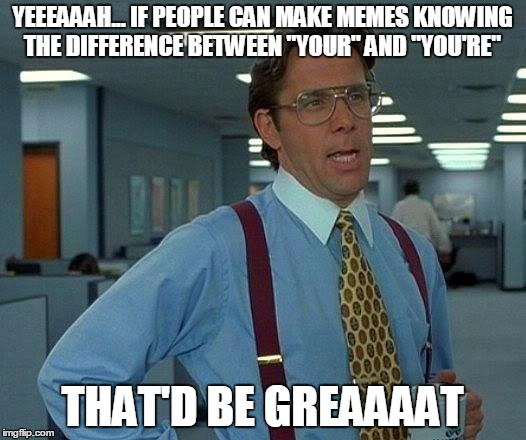This seems to be a reoccurring theme on this board so I thought it was a good time for a refresher on when you use "your" vs "you're". Not naming names but @hawkedoff might want to pay attention.
Did you know English is frequently cited as a very hard language to learn? Hmm, we wonder why?
Well, its difficulty explains the mistakes we all make when speaking. But writing in English has its own unique set of challenges. One of the most common mistakes is telling you’re and your apart.
They look similar, right? Even if they sound the same and look like fraternal twins, they serve two distinct and different purposes.
When to use you’re
Let’s take a look at you’re first.
You’re is a contraction of the phrase you are. Easy enough to remember. Here’s how it looks in a few sentences:
When to use your
Your is a possessive adjective used to show ownership. It is not a contraction. Your is usually followed by a noun (including gerunds).
Take these sentences, for example:
Why isn’t there an apostrophe for the possessive your?
A big reason why people get these confused is the association of apostrophes with possession, such as:
Tips
Your first line of defense is to stop the mistake before it reaches the page. Identify which of the words has the apostrophe.
Step 2: reread your writing and say “you are” instead of using the contraction. This editing tip will snuff out most misuse of the two words.
Let’s test your new skills. Can you identify if your and you’re are used correctly in these sentences?
Thankfully, once you understand the key differences, the correct use of these terms should be the least of your worries. You can move on to other more challenging and frequently mixed-up pairs, like affect vs. effect, complement vs. compliment, or even infamous vs. notorious!
In no time, you’ll have conquered the English language!
Did you know English is frequently cited as a very hard language to learn? Hmm, we wonder why?
Well, its difficulty explains the mistakes we all make when speaking. But writing in English has its own unique set of challenges. One of the most common mistakes is telling you’re and your apart.
They look similar, right? Even if they sound the same and look like fraternal twins, they serve two distinct and different purposes.
When to use you’re
Let’s take a look at you’re first.
You’re is a contraction of the phrase you are. Easy enough to remember. Here’s how it looks in a few sentences:
- You’re my best friend!
- I think you’re the perfect match for the job.
- Make sure you’re healthy.
When to use your
Your is a possessive adjective used to show ownership. It is not a contraction. Your is usually followed by a noun (including gerunds).
Take these sentences, for example:
- Your hair looks great today!
- I wish I had your energy.
- Has all your running around made you tired?
Why isn’t there an apostrophe for the possessive your?
A big reason why people get these confused is the association of apostrophes with possession, such as:
- That is George’s dog.
- Susan’s cake won the baking competition.
Tips
Your first line of defense is to stop the mistake before it reaches the page. Identify which of the words has the apostrophe.
Step 2: reread your writing and say “you are” instead of using the contraction. This editing tip will snuff out most misuse of the two words.
Let’s test your new skills. Can you identify if your and you’re are used correctly in these sentences?
- Your so talented at playing you’re piano.
- It’s important you express you’re emotions.
- Washing your clothes is necessary.
Thankfully, once you understand the key differences, the correct use of these terms should be the least of your worries. You can move on to other more challenging and frequently mixed-up pairs, like affect vs. effect, complement vs. compliment, or even infamous vs. notorious!
In no time, you’ll have conquered the English language!



